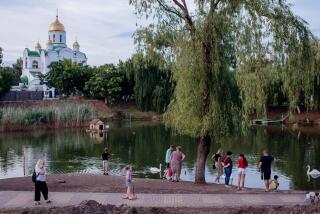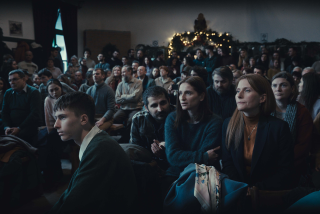Travel Horrors: Romania : Oh, Horse Lips! : Warning: In Transylvania, objects on your car hood may appear exactly as close as they really are
- Share via
I’d been in Bucharest only a few hours and already I was desperate to leave the city. I wanted to be back in the Carpathian Mountains, surrounded by sweet air and forest, roaming rocky gorges filled with myths and music.
On other visits to Transylvania, I’d heard the fiddles of Gypsies at roadside campfires and, in hillside pastures, spent afternoons with shepherds who knew each sheep in their commune’s flocks by name. I’d been
invited in for soup and stories by farm wives and once, at sunset in the mountain pass where Bram Stoker had envisioned Dracula’s castle, had slid down a hayrick with a young couple at the end of their workday.
“Yes, one cannot go to Transylvania and leave unchanged,” Nicolae Paduraru said portentously as we walked Calea Victoriei in Bucharest, the central boulevard running past the palace from University Square.
A translator, writer and sometime-journalist I’d met here in the mid-1980s, he insisted on accompanying me this time. “You can’t expect to leave me behind if you’re driving into Transylvania. It’s always like a pilgrimage for me. Besides, how will you live without my stories?”
Nick’s the kind of fellow who’d like to think he could assume the mantle of prophecy. He’s slight, quick and voluble; self-possessed in a tweedy, turtleneck-sweater sort of way.
There’s something of a slick smoothness about him, too--a presence that helped protect him during the rule of Nicolae Ceausescu; it had let Nick move about certain political and academic circles despite his refusal to become a member of the Communist Party. (After the December, 1989, revolution, he’d likewise turned down an invitation to join the new ruling council.)
He’d become something of an expert on Romanian folk tales and legends. His fluency in English had made him a valuable resource as a translator and guide. When British and American tourists in the 1970s asked about places associated with the vampire Dracula, confounded bureaucrats had turned to Nick to find out what these people could possibly be talking about.
Romanians knew about Dracula. Or, rather, about Vlad Dracula, the 15th-Century head of state called “the impaler” because of his peculiar fondness for that method of killing Turkish invaders--as well as Gypsies, Hungarians, Saxons, Bulgars, Greeks and any Romanian subjects who irritated him.
But Stoker’s gothic tale about a vampire of the same name (inspired, apparently, by the murderous prince) had not yet been translated into Romanian.
Nick found the book, read it and became a fan. He devised tours for the London-based Dracula Society and began to research what he promises some day will be the definitive book on the Dracula legend--”written as only a Romanian could: from the heart, truth made bigger and truer with superstition, exaggeration and bloody imagination.”
“So,” Nick said, “it’s settled. We go together. It’s time for an adventure.”
But even he could not imagine Dani, and how we’d meet on that forest road. . . .
In the morning, the highway north out of Bucharest was lined with touching expressions of enterprise in the wake of the revolution. Every few hundred yards, farm families had set up tables from which they sold vegetables. All they had were radishes: three bunches on one table, five on the next, one on the next. . . .
As the road narrowed between borders of walnut trees and began to rise into the Carpathian foothills, automobile traffic virtually disappeared. We shared the road with a few trucks, a few tractors and an endless series of horse carts.
Long red tassels hung from the bridles of most of the horses. “That’s to ward off the evil eye,” Nick said. “Superstition, folk knowledge and myth are a living force in the life of the country people of Romania.”
If political changes don’t concern people much in some of the more remote areas of the country, it may be because following the prescriptions of folk customs takes up so much time and concentration.
For example, one must be very careful in meeting a person’s approach; you risk cutting the thread of good luck if you cross over another’s path before you pass. . . . If one drops a loaf of fresh bread on the floor, he must pick it up quickly and kiss it.
Even if superstitions have lost some of their force, they continue to help define the way people look at the world: There’s treasure to be found where one sees the first swallow of the season. . . . A magpie on a roof signifies the approach of guests; a shrieking magpie meeting or accompanying a traveler denotes death. . . .
*
It was a day or two later that we met Dani. Or he met us. Head on.
We headed far off the main highway into the Harghita hills of the area called the Baraolt, within the craggy crescent of the Carpathians that separates the Transylvanian plateau from Wallachia in the south and Moldavia in the east.
The blood-red Dacia we were driving had long since surrendered its suspension to the chasmic potholes and muddy fissures that corrugated the roads. Its engine moaned eerily; its transmission howled as it cruised, by necessity, mostly in low gear.
Vlad, we’d come to call the little coupe. It seemed determined to impale us on its springs.
We were on a quest, in pursuit of a Transylvanian legend not associated with Dracula. The German-speaking Saxons of Transylvania tell about a cave: Almasi Homorod (Cave of the Apples).
As the story goes, it was from this cave that the children the Pied Piper led into the earth at Hameln, Germany, finally emerged. The Saxons of Romania considered themselves their descendants.
Istvan Denes, a geologist and devoted spelunker, has found pottery and knives and spear points dating to Neolithic times in the cave, as well as artifacts from later times, when local villagers would seal themselves behind a wall of rocks to escape from invaders.
Asking in the village of Virghis (or Vargyas in Hungarian, the predominant language of the Szeklers who live in the area) for directions to the cave, we learned that Denes would be there, and Nick and I set off along a 10-mile dirt forestry track into wild hills where wolves and bears still roam.
About halfway back, I stopped the car. I had to take a bathroom break, and walked off into the trees. Just then, at the crest of a knoll ahead of us, a woodcutter and his horse and wagon appeared.
Nick slid over into the driver’s seat to move the car slightly off the path, to give the horse room to pass.
That’s when a strap on the wagon harness broke.
Over my right shoulder I saw the horse and cart start to careen down the hill, the woodcutter struggling futilely to bring it under control.
Over my left shoulder I saw Nick, in the car, go pale.
Over my right shoulder I saw the horse, frantically trying to stop, all four legs backpedaling, eyes rolling, teeth bared.
Over my left shoulder I saw Nick, with the same expression on his face.
In the next second, the horse, having leaped as best it could to avoid a head-on collision, was lying sideways across the hood of the Dacia, like a hunter’s trophy.
The car sagged, its wheel wells resting on the ground under the weight. The horse’s face was pressed against the windshield, nostrils flared, flattened and foaming.
A few inches away, Nick’s nostrils were flaring.
“Dani! Dani!” the woodcutter called to the horse.
It took about 15 minutes for Andras, the woodcutter, and me to untangle the horse and pull it from the car. Nick walked into the woods and sat under a tree.
We spoke soothingly to Dani, who was trembling. We spoke soothingly to Nick, who was trembling.
In the end, Dani, Nick and Vlad the car proved to have survived the shock, only a little the worse for wear--shaken, stirred and well-dented, respectively.
We gave Andras a bottle of American bourbon and a carton of Marlboros we’d brought along as a gift. One always travels in Romania with such gifts.
We gave the constable at Virghis a bottle of bourbon and two cartons of cigarettes. He made us sit in his office for an hour, as he gathered some friends to share the story, pointing at us and laughing.
Nick asked if I’d mind if we didn’t save the last bottle of bourbon as a gift.
“Did you notice,” he said, “that the horse wasn’t wearing red tassels, like the other horses we saw? In Transylvania, it’s not wise to tempt fate.
“I might get some tassels for myself . . . . You didn’t hear a magpie screeching by any chance today, did you?”
We never did make it to the cave. At the end of the trail we met Denes, who told us that the spring rains had made impassable a stream we would have to cross. So we sat and shared lunch, and stories.
More to Read
Sign up for The Wild
We’ll help you find the best places to hike, bike and run, as well as the perfect silent spots for meditation and yoga.
You may occasionally receive promotional content from the Los Angeles Times.






